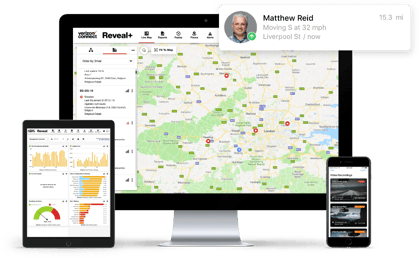9 Secrets to Reducing your Fleet Expenses
As a fleet owner, your day-to-day costs can quickly add up. What you don’t know is there are further hidden, expensive...
Read more
Plenty is written, quite rightly, about the enormous potential of GPS fleet tracking to help businesses work smarter and more efficiently. As GPS vehicle tracking solutions can help businesses save money, improve productivity and ultimately increase profitability, it’s understandable that these are usually the take-home messages regarding the technology.
Less, however, is discussed about the potential impact that such a solution can have on those using it every day on the front line. Therefore, in somewhat of a break from the norm, this isn’t an article for the business owners or fleet managers out there, it’s for the drivers.
As a driver, you’re understandably concerned by any technology that has the potential to change the way you work – regardless of the positive impact it may have on the business as a whole. So, we’re putting the business benefits of GPS tracking aside for a moment to address your concerns, dispel some common misconceptions and help you, the drivers, overcome your barriers and better embrace GPS vehicle tracking technology.
Let’s tackle the four most common driver complaints:
A common complaint about GPS tracking is that it is only implemented when management no longer trust their drivers. Whilst it may feel this way, the reality is a robust GPS solution is about far more than simply tracking location.
The data gathered can be used to optimise routes, cutting out unnecessary mileage from your day; re-route you in near real-time should there be heavy traffic on your route; or monitor vehicle condition to help reduce the risk of a breakdown that might leave you stranded. Should you run in to trouble out on the road, location data can also be used to send assistance straight to your location.
The ability to keep tabs on your whereabouts is just one feature of a GPS solution, and in truth, if this is your boss’s primary aim, there are far more efficient ways to go about it.
It’s not unusual for drivers to perceive a GPS roll out as a sign that the powers that be think they are doing something wrong – or simply not performing to a high enough standard. While GPS tracking can certainly aid towards a boost in productivity and efficiency, it doesn’t achieve this by shaming drivers into working harder.
Find the right solution for your business with our free Fleet Management Buyer’s Guide.
Rather, GPS simplifies processes like payroll, timesheets, and job-related paperwork, freeing up drivers to drive – boosting productivity by enabling you to fit more into the working day.
To put it another way: the purpose of GPS tracking is to help reduce any practices that are slowing you down, such as inefficient routing or excessive paperwork, rather than a tool to reprimand drivers for not working fast enough.
If your boss installs technology on your vehicle that has the ability to track your location, it’s not uncommon for thoughts of ‘Big Brother’ to spring to mind. Many drivers feel like GPS technology is an overreach as it offers access to vehicles and their drivers 24/7, even outside of working hours. However, providing you abide by your company’s vehicle use policy, there is nothing to fear here.
Most employers only track vehicles outside of working hours to cut down on unauthorised use, or to be alerted of break-in and theft. If you’re driving your company vehicle when and where you should be, your boss will have little interest in what you get up to when you clock off.
Another common complaint leveled at GPS tracking is that it can automate what was once a human interaction. Drivers often object that as location data and ETAs are collected and reported, without their involvement, they have less contact with HQ and the company starts to become faceless.
It is certainly fair to say that GPS tracking can automate what were once human processes, offering live ETAs, logging time spent at jobs and so on, but it also presents opportunities for much more fruitful interactions.
Data gathered by a GPS solution can be used to run incentive and reward programmes to celebrate driver performance, and we can all agree being told you’re doing a good job is far better than a snatched conversation about your next ETA.
Click here to learn more about our GPS fleet tracking solutions.
Tags: Cost control, Productivity & efficiency, Data & analytics, Payroll




Find out how our platform gives you the visibility you need to get more done.
As a fleet owner, your day-to-day costs can quickly add up. What you don’t know is there are further hidden, expensive...
Read moreVerizon Connect Reveal tracks the fleet data that can have a big impact on your business. These are things like where...
Read moreAt Verizon Connect, we can only provide the highest possible level of service to fleet managers and business owners by...
Read moreReveal tracks the fleet data that can have a big impact on your business. These are things like where your vehicles are...
Read more